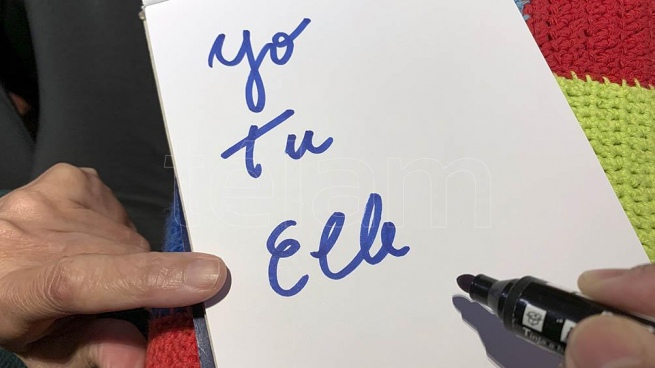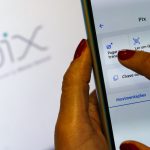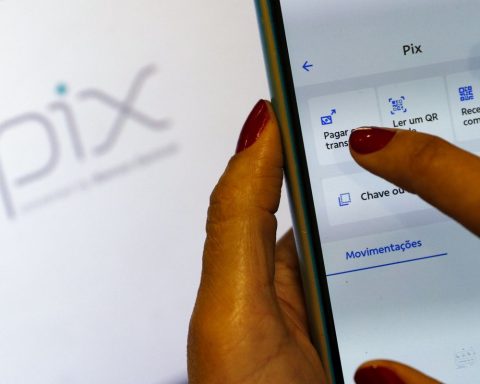The inclusive and non-binary language guarantees the right of children and adolescents who do not perceive themselves as male or female to be named and to respect their identity in accordance with Argentine legislation, specialists analyzed when questioning the decision of the Buenos Aires Government to prohibit the use of ‘e’, ’x’ and ‘@’.
The relevant forms of language “are those linked to gender identity, not as a grammatical mark, as an identity, as a person’s right to be named, treated, according to the Gender Identity Law that has been in force since 2012 in the country”, says in dialogue with Télam, Mara Glozman.
The professional is a researcher at Conicet and professor of Linguistics at the National University of Hurlingham.
“It is a much broader semantic field, it goes far beyond spellings (x, @) or morphemes (letter e). That is the persecuted inclusive language, the one that goes against binary and non-sexism”Mary Glozmann
The prohibition of inclusive language in an institutional way in the schools of the city of Buenos Aires was announced on Thursday, with the publication of circular 4/2022 of the Ministry of Education headed by Soledad Acuña.
On Friday, at a press conference, the head of the Buenos Aires government, Horacio Rodríguez Larreta, stated that “from now on” teachers in the city of Buenos Aires “have to respect the rules of the Spanish language, both when they are in front of the classroom and when they address the children and their families in communications”.
“I am a university professor and I speak in egalitarian language, but my students know that they can use it if they want to or not”Nor Lotus
That inclusive language and the non-binary language now prohibited by the Buenos Aires authorities “were born from critical observation and circulate without being imposed in schools and universities,” adds Nor Loto, university professor and member of the Circle of Feminist Linguists.
“I am a university professor and I speak in egalitarian language, but my students know that they can use it if they want to or not,” she explains.
For her, the egalitarian language “collaborates in the perception of all the nuances of humanity, appeals to creativity and places us critically before dominant ideologies. That is, that only for these three aspects should its use in schools not be prohibited”.

-Télam: What is inclusive language?
-Mara Glozman: It is a set of linguistic forms. It is not a language in its entirety, it refers to certain linguistic forms that are used to refer to people, not objects. It includes diverse, heterogeneous possibilities. There are those who refer to people in a binary way (everyone). Another possibility is to use non-binary forms with the ‘e’ or in writing with the ‘x’. The ‘x’ works in a heterogeneous way, it allows not setting a gender variable. That ‘x’ is read estimated, estimated, estimated, to give an example. Replaces the vowel that marks the grammatical gender. Other variants such as ‘les pibis’ are used above all by adolescents looking for alternatives to the fact that in Spanish the ‘e’ tends to mark the masculine (example: nene). The ‘i’ marks the difference from the ‘e’.
In this regard, Loto adds that inclusive language “is a much broader semantic field, it goes far beyond spellings (x, @) or morphemes (letter e). That is the inclusive language pursued, the one that goes against the binary and non-sexism”.
Speaking of inclusive language “is much broader, it is to include native peoples, people with disabilities, older people, migrants, and more, it is to include all people and their nuances in various ways and with different strategies,” he adds.
Supporting his decision, Rodriguez Larreta said on Friday that “in the school we have to respect the Spanish language because the indices show that it is urgent; we cannot lose another day,” referring to the results of the last evaluation on Language carried out in 6th grade primary school students and 3rd year high school students from Buenos Aires announced days ago, reflecting a setback during the pandemic.
-T: What do you think of the resolution of the Buenos Aires Government?
-MG: First, a resolution that seeks to prohibit goes against an acquired and institutionalized right. Second, there are technical inconsistencies, because they are concerned with the ‘e, ‘x’, and they link it to supposed bad learning. They mix language learning with writing learning. The, the, the girls arrive at school with a linguistic system. At school we reflect on grammar, linguistics, orthographic regulations. The grammar of a linguistic system is neither bad nor good. A linguistic system cannot have a moral position, it is described, investigated and hypotheses with variants and possibilities are formulated. A scientific position is never prescriptive from good and evil. The prescriptive position is, among others, the function of the academies of letters such as the Spanish or Argentine. The Argentine Academy of Letters was created during the dictatorship of (José Félix) Uriburu (who led the coup that overthrew the Government of Hipólito Yrigoyen in 1930). It was created on August 13, 1931 to purify the language. It is not surprising that when seeking to prohibit or prescribe, it is brought as a reference to a prescriptive institution.

-T: The Buenos Aires authorities put as precedent a ban on the use of inclusive language in France. Did you investigate about it?
-MG: I wrote an essay. The debates in other countries or societies are not transferable, they are different realities. In France, there were a series of restrictive measures, of what they call inclusive writing. It is very different from the Argentine reality.
When in May 2021, the then French Minister of Education Jean-Michel Blanquer issued a circular to try to ban the use of inclusive writing, historian Eliane Viennot, professor emeritus at the University of Saint-Étienne and member of the University Institute of France In addition to being a historian, she told the press that the decision was “an invitation, but if it is not followed, there is no foreseen sanction. It is not a decree, it is not a law.” The teachers unions resisted it.
-T: Is inclusive language a political position?
-MG: It is a political position, without a doubt. The difference is that a law is violated in pursuit of an illusion of correct Spanish. The use of Spanish that is mentioned in the resolution is poorly formulated. There is no support for what they say. The resolution says ‘distortions’, which is a very old idea that has no scientific basis. There are linguistic forms, there is no good or bad speaking. We have normalized, we believe that there are good and bad ways of speaking, but that has no scientific basis. There are forms that exist and others that do not, and we describe those that exist.
Loto highlights that in schools “there are boys, girls and children who exist and must be named. My son goes to a secondary school where he shares his days with two classmates who have fought for their identity and want to continue being named. I hope that a ban does not result in discrimination”.
And Glozman sums up by saying that inclusive language is “politically relevant because it is the possibility of a person being named. If we name a man in feminine, he would not feel well treated. So why is a non-binary person not named? It is a universal right.”


















